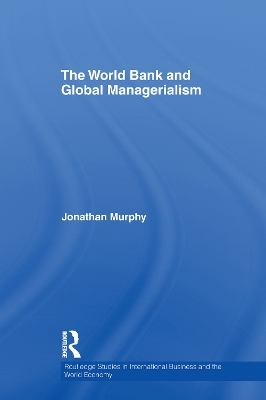
The World Bank and Global Managerialism
Seiten
2014
Routledge (Verlag)
978-0-415-75955-7 (ISBN)
Routledge (Verlag)
978-0-415-75955-7 (ISBN)
An original and insightful contribution to the literature on globalization, this book develops and clearly illustrates, using the World Bank (a major agent of the new global managing élite) as a case study, the concept of a new ‘global managerialism’ and its impact on business across the world.
In recent years, a great deal of scholarly and popular ink has been spilled on the subject of globalization. Relatively few scholars have addressed the political sociology of globalization, and specifically, the emergence of global class formations and a nascent global governance framework. This book is a contribution towards redressing this imbalance.
The book traces the emergence of the World Bank as a key driver of globalization, and as a central source of an evolving form of elite-driven transnational governance which the author describes as ‘global managerialism’. The book argues that the Bank has expanded its sphere of activity far beyond provision of low-cost capital for development projects, and plays a central role in pursuing global economic and social policy homogenization. The World Bank and Global Managerialism features a new theoretical approach to globalization, developed through an analytical exposition of the key stages in the institution’s growth since its creation at the Bretton Woods conference of 1944. The author details the contemporary Bank’s central policy framework, which includes the intertwining of public and private initiatives and the extension of global governance into ever-wider policy and geographic spheres. He also argues that contemporary globalization marks the emergence of a transnational elite, straddling the corporate, government, and civil society sectors. The book provides two detailed case studies that demonstrate the practical analytical utility of the theory of global managerialism.
The theoretical approach provides a robust but flexible framework for understanding contemporary global development. It is essential reading for courses in areas such as International Organizations, Global Political Economy, and Globalization and its Discontents, and is also relevant to students of development policy and international economic architecture, among others.
In recent years, a great deal of scholarly and popular ink has been spilled on the subject of globalization. Relatively few scholars have addressed the political sociology of globalization, and specifically, the emergence of global class formations and a nascent global governance framework. This book is a contribution towards redressing this imbalance.
The book traces the emergence of the World Bank as a key driver of globalization, and as a central source of an evolving form of elite-driven transnational governance which the author describes as ‘global managerialism’. The book argues that the Bank has expanded its sphere of activity far beyond provision of low-cost capital for development projects, and plays a central role in pursuing global economic and social policy homogenization. The World Bank and Global Managerialism features a new theoretical approach to globalization, developed through an analytical exposition of the key stages in the institution’s growth since its creation at the Bretton Woods conference of 1944. The author details the contemporary Bank’s central policy framework, which includes the intertwining of public and private initiatives and the extension of global governance into ever-wider policy and geographic spheres. He also argues that contemporary globalization marks the emergence of a transnational elite, straddling the corporate, government, and civil society sectors. The book provides two detailed case studies that demonstrate the practical analytical utility of the theory of global managerialism.
The theoretical approach provides a robust but flexible framework for understanding contemporary global development. It is essential reading for courses in areas such as International Organizations, Global Political Economy, and Globalization and its Discontents, and is also relevant to students of development policy and international economic architecture, among others.
Jonathan Murphy is Lecturer in International Management at Cardiff Business School, Wales.
Introduction 1. Towards a Theory of Global Managerialism 2. The Genetic Code of Global Managerialism 3. The Poverty Bank 4. The Managerial Bank 5. The Bank, Global Social Policy and Civil Society 6. The Bank and the Private Sector. Conclusion
| Erscheint lt. Verlag | 19.5.2014 |
|---|---|
| Reihe/Serie | Routledge Studies in International Business and the World Economy |
| Zusatzinfo | 1 Tables, black and white; 8 Line drawings, black and white; 3 Halftones, black and white; 11 Illustrations, black and white |
| Verlagsort | London |
| Sprache | englisch |
| Maße | 152 x 229 mm |
| Gewicht | 317 g |
| Themenwelt | Sozialwissenschaften ► Politik / Verwaltung ► Europäische / Internationale Politik |
| Sozialwissenschaften ► Politik / Verwaltung ► Staat / Verwaltung | |
| Sozialwissenschaften ► Soziologie | |
| Wirtschaft ► Betriebswirtschaft / Management ► Finanzierung | |
| Wirtschaft ► Betriebswirtschaft / Management ► Planung / Organisation | |
| Betriebswirtschaft / Management ► Spezielle Betriebswirtschaftslehre ► Bankbetriebslehre | |
| Wirtschaft ► Volkswirtschaftslehre ► Finanzwissenschaft | |
| Wirtschaft ► Volkswirtschaftslehre ► Makroökonomie | |
| Wirtschaft ► Volkswirtschaftslehre ► Wirtschaftspolitik | |
| ISBN-10 | 0-415-75955-2 / 0415759552 |
| ISBN-13 | 978-0-415-75955-7 / 9780415759557 |
| Zustand | Neuware |
| Haben Sie eine Frage zum Produkt? |
Mehr entdecken
aus dem Bereich
aus dem Bereich
denken und handeln wie ein professioneller Trader
Buch | Softcover (2023)
Vahlen, Franz (Verlag)
CHF 51,65


